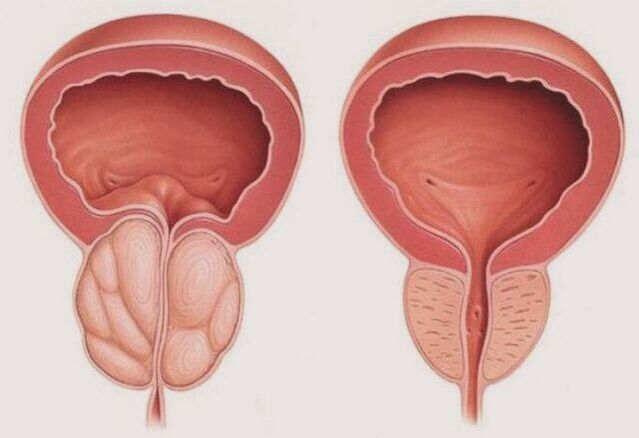Prostatitis is an inflammation of the prostate. Currently, urologists tend to believe that prostatitis is not a single disease but combines several diseases of the male genitals. This is one of the most common pathologies of the male urogenital tract, and experts say there is a steady increase in the percentage of men who suffer from some form of prostatitis. The risk of developing prostatitis increases with age.
Causes of prostatitis
The direct cause of prostatitis is two factors of equal importance. The first is congestion of the pelvis and, as a result, the prostate, and the second is the addition of infection. However, in some cases, no infectious agent can be detected in the tissues of the prostate, presumably in such cases, autoimmune processes become the cause of prostatitis, which means that the prostate is attacked by cells of its own immune system. due to a system failure.
Predisposing factors for the development of prostatitis: weakening of the immune system due to infection, hypothermia, stress; hormonal disorders, deficient ejaculation, physical inactivity, dietary preferences (dependence on fried, fatty, smoked, spicy foods), frequent urinary retention. Irregular sex is considered a common cause of prostatitis.
Types of prostatitis
The international classification of prostatitis, which is the most complete and covers all types of inflammation, has now been adopted:
- Category I. Acute prostatitis;
- II. category. Chronic bacterial prostatitis;
- III. category. Non-bacterial chronic inflammation of the prostate / chronic pelvic pain syndrome - a disease in which no infection is detected that lasts for more than 3 months;
- III. Subcategory A. Chronic inflammatory pelvic pain syndrome (leukocytes are defined by the secretion of the prostate);
- Subcategory III B. Chronic, non-inflammatory pelvic pain syndrome (no leukocytes in the secret of the prostate);
- ARC. category. Asymptomatic chronic inflammation of the prostate (leukocytes are present in the secret of the prostate, the patient does not report any complaints, the disease is accidentally detected).
- pain in the pelvis and genitals;
- urinary disorders, which include sluggish flow, intermittent flow, incomplete bladder emptying, frequent urination, etc. ;
- genital disorders.
- analysis of prostate secretion;
- digital rectal examination;
- transrectal ultrasound of the prostate;
- Ultrasound of the kidneys and bladder;
- blood test for PSA (prostate antigen);
- general blood test;
- general urine analysis;
- urine analysis for urogenital infections before and after prostate massage;
- uroflowmetry (urine test).
Symptoms of prostatitis

There is a so-called "prostatitis triad, " the three most common symptoms of prostatitis. These include:
It should be noted that not all three symptoms of prostatitis are mandatory, and acute and chronic prostatitis occur in different ways.
Symptoms of acute prostatitis: severe, sharp pain in the prostate area, applied to the rectum, perineum, testicles, lower back; deterioration of general condition, fever, headache and muscle aches, general weakness; violation of urination to acute urinary retention due to prostate edema and urethral compression.
Symptoms of chronic prostatitis: pain in the area of the prostate gland but less intense than in acute prostatitis; urinary tract disorders, sexual disorders: incomplete erection, short-term erection, accelerated ejaculation, etc. Chronic prostatitis can be fluctuating, with exacerbation periods being replaced by periods of remission, or with persistent mild symptoms.
Unlike other inflammatory diseases, where the chronic process is a consequence of untreated acute inflammation, chronic prostatitis is often primary when the patient has difficulty determining the onset of the disease.
Diagnosis of prostatitis
The following tests are performed to diagnose prostatitis:
The main thing in the diagnosis is to identify the cause of the inflammation of the prostate, as therapeutic measures depend on it. Another diagnostic challenge is the exclusion of prostate cancer.
Treatment of prostatitis
Acute and chronic prostatitis of bacterial origin is treated with antibacterial drugs. High doses of antibiotics are prescribed for acute prostatitis even before the results of bacterial culture are obtained, as the acute process requires immediate action. The complex prescribes anti-inflammatory drugs that also have analgesic effects.
Chronic prostatitis is treated depending on the cause. For non-bacterial prostatitis, general booster, immunomodulatory medications are taken. Treatment of prostatitis is performed with the mandatory participation of physiotherapy procedures: laser therapy, magnetotherapy, electrophoresis of medicinal substances, ultrasound, etc.
Urologists say that treating prostatitis with medical devices will only lead to temporary relief because treating prostatitis without changing your normal lifestyle is ineffective. You need to stop bad habits, live an active lifestyle, eliminate hypodynamics, avoid pelvic stagnation with special gymnastics, try to spend less time in the car, walk more, and keep enough rest.
It is also important to improve your sex life, make it regular, and eat well. Chronic prostatitis is prone to relapse, so lifestyle changes should be permanent, and only then can the treatment of prostatitis lead to complete recovery.
Treatment of prostatitis with folk remedies
Folk methods for the treatment of prostatitis are widely and successfully used, especially for the treatment of chronic prostatitis. They work more softly than drugs, but are still quite effective and cause fewer side effects, so treatment for prostatitis with folk remedies can be done for a long time until the symptoms of the disease go away.
Among the folk remedies for the treatment of prostatitis, teas made from anti-inflammatory and antibacterial herbs are widely used: chamomile tea, sage leaves, calendula, etc. Herbs are also used in the form of tinctures and balms. Honey and bee products are used as reinforcements. Beeswax is excellent for wrapping to treat chronic prostatitis, replacing paraffin wax. Echinacea tincture is used as a mild immunostimulant, and some types of honey have been used successfully for the same purpose.





























